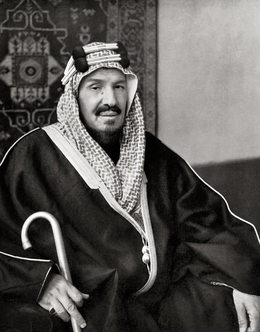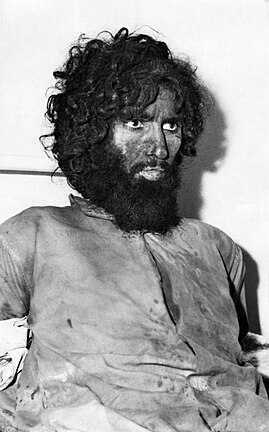
The history of Saudi Arabia in its current form as a state began with its foundation in 1744, although the human history of the region extends as far as 20,000 years ago. The region has had a global impact twice in world history:
- In the 7th century it became the cradle of Islam and the capital of the Islamic Rashidun Caliphate.
- From the mid-20th century the discovery of vast oil deposits propelled it into a key economic and geo-political role.

Abdulaziz ibn Abdul Rahman ibn Faisal ibn Turki ibn Abdullah ibn Muhammad Al Saud, usually known within the Arab world as Abdulaziz and in the West as Ibn Saud, was the first monarch and founder of Saudi Arabia, the "third Saudi state".

Faisal bin Abdulaziz Al Saud was King of Saudi Arabia from 1964 to 1975. He emerged as an influential royal politician under his father King Abdulaziz and brother King Saud. While crown prince in 1962, Faisal outlawed slavery in Saudi Arabia. He persuaded King Saud to abdicate in 1964 with the help of other members of the royal family and his maternal relative the grand mufti of Saudi Arabia, and Faisal became king.

Khalid bin Abdulaziz Al Saud was King of Saudi Arabia from 1975 to 1982. His reign saw both huge developments in the country due to increase in oil revenues and significant events in the Middle East.

The House of Saud is the ruling royal family of Saudi Arabia. It is composed of the descendants of Muhammad bin Saud, founder of the Emirate of Diriyah, known as the First Saudi state (1744–1818), and his brothers, though the ruling faction of the family is primarily led by the descendants of Ibn Saud, the modern founder of Saudi Arabia. The most influential position of the royal family is the King of Saudi Arabia. King Salman, who reigns currently, chose first his nephew and then his son as the crown prince without consulting the Allegiance Council. The family is estimated to comprise 15,000 members, but the majority of the power and wealth is possessed by a group of about 2,000 of them.

Custodian of the Two Holy Mosques (Arabic: خَـادِم الْـحَـرَمَـيْـن الـشَّـرِيْـفَـيْـن, Khādim al-Ḥaramayn aš-Šarīfayn; Servant of the Two Noble Sanctuaries or Protector of the Two Holy Cities, is a royal style that has been used by many Muslim rulers, including the Ayyubids, the Mamluk Sultans of Egypt, the Ottoman Sultans, and in the modern age, Saudi Arabian kings. The title refers to the ruler taking the responsibility of guarding and maintaining the two holiest mosques in Islam: Al-Haram Mosque in Mecca and the Prophet's Mosque in Medina, both of which are in the Hejazi region of the Arabian Peninsula.

The Makkah Region or Mecca Region is the most populous region (minṭaqah) in Saudi Arabia. It is located in western Saudi Arabia, and has an extended coastline. It has an area of 153,128 km², and a population of 8,557,766. Its capital is Mecca, the holiest city in Islam, and its largest city is Jeddah, which is also Saudi Arabia's main port city. The third major city is Taif. This region also contains Rabigh, roughly the present-day area where the Islamic Nabî Muhammad gave his famous sermon at the event of Ghadir Khumm.

Juhayman ibn Muhammad ibn Sayf al-Otaybi was a Saudi militant and former Saudi Arabian soldier who in 1979 led the Grand Mosque seizure of the Masjid al Haram in Mecca, Islam's holiest site, to protest against the Saudi monarchy and the House of Saud.
Muhammad bin Abdul-Rahman was a son of Abdul-Rahman bin Faisal, Imam of the Second Saudi State based in Riyadh. Muhammad was an early supporter of his own brother King Abdulaziz. However, Muhammad and Abdulaziz had a falling-out after both attempted to place their respective sons in line for kingship. This conflict may have led to the death of Muhammad's son Khalid. Muhammad later became a virtual non-entity in Saudi politics.
Turki (II) bin Abdulaziz Al Saud was a member of the House of Saud.
Fawwaz bin Abdulaziz Al Saud was a senior member of the House of Saud. In 2006, Fawwaz became one of the members of the Allegiance Commission. However, he died in July 2008, some six months after the establishment of the council.

The unification of Saudi Arabia was a military and political campaign, by which the various tribes, sheikhdoms, city-states, emirates, and kingdoms of most of the Arabian Peninsula were conquered by the House of Saud, or Al Saud, between 1902 and 1932, when the modern-day Kingdom of Saudi Arabia was proclaimed under the leadership of Ibn Saud, creating what is sometimes referred to as the Third Saudi State, to differentiate it from the Emirate of Diriyah, the First Saudi State and the Emirate of Nejd, the Second Saudi State, also House of Saud states.
Battle of Mecca took place in Mecca, in what is now known today as Saudi Arabia, following the fall of Ta'if to King Abdulaziz Ibn Saud in his campaign to conquer the Kingdom of Hejaz. King Hussein bin Ali fled from Mecca to Jeddah, leaving behind a cache of weapons in the Qishla of Mecca which were recovered by Saudi forces. The battle in Mecca resulted in Hashemite defeat to Saudis and the allied Ikhwan.
Hussa bint Ahmed Al Sudairi (1900–1969) was one of the many spouses and cousins of King Abdulaziz and the mother of King Fahd and King Salman, monarchs of Saudi Arabia. Her sons Sultan, Nayef, and Salman served successively as Crown Prince during their half-brother Abdullah's reign, as their brother Fahd had done during the reign of Khalid, another half-brother. Her adult sons are informally known as the "Sudairi Seven".

The Ministry of Foreign Affairs (MOFA) is the ministry responsible for handling the Kingdom of Saudi Arabia's external relations. The ministry oversees "political, cultural and financial international relations" and monitors the Kingdom's diplomatic relations. It was created in 1930 by a royal decree issued by King Abdulaziz Al Saud, being the first ministerial body created by the King.
Hathloul bin Abdulaziz Al Saud was a senior prince of the House of Saud, and a member of the Kingdom of Saudi Arabia's Allegiance Council.

The King of Saudi Arabia is Saudi Arabia's absolute monarch who serves as head of state and head of government. He is the head of the Saudi royal family, the House of Saud. The King is called the Custodian of the Two Holy Mosques, a title that signifies Saudi Arabia's jurisdiction over the mosques of Masjid al Haram in Mecca and Al-Masjid an-Nabawi in Medina, replacing His Majesty in 1986.
The King Abdulaziz Public Library, also known as "KAPL", is located in Riyadh, Kingdom of Saudi Arabia.













